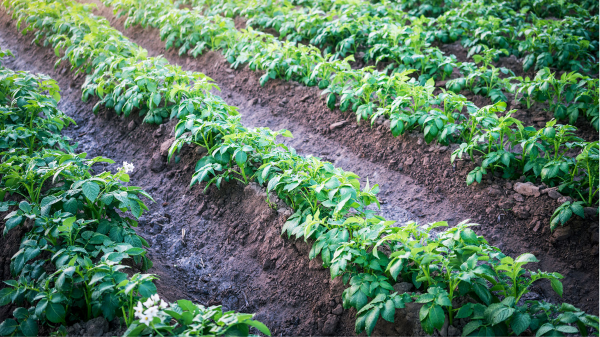Sustainable agriculture means many things to many growers, but as this environmentally friendly approach to farming spreads, some common themes are emerging.
Many of them are found in an experimental potato farm in Canada’s New Brunswick province operated by McCain Foods BB #:116524, a 65-year-old frozen-food business. The company is setting up another such farm in South Africa—a very different climate from chilly New Brunswick.

Frozen food includes French fries, and McCain contracts with 3,500 potato growers worldwide for its supply.
Sustainable is not the same as organic and does not rule out the judicious use of pesticides. One method being tried on McCain’s farm is “a crop-spraying rig that uses artificial intelligence to identify bugs and weeds that can harm the crop,” reports the Guardian.
https://www.theguardian.com/environment/2022/nov/05/potatoes-future-climate-emergency-canada
“Instead of spraying the whole field, pattern-recognition systems spot unwanted invaders and direct nozzles to target them. It takes just 200 milliseconds to identify a beetle and spray it.”
The rig could cut pesticide use between 50 and 80 percent.
Another innovation is an “autonomous vision tuber grading machine.” Sensors in this potato sorter grade for gravity and density as well as “hollow heart”—empty cavities inside the potato.
The sorter enables growers to test far more samples than they can do manually—7 potatoes out of 200.
Another unit employs gamma rays to create a physical and chemical portrait of a field.
DNA sampling is also used, along with the increasingly omnipresent drones, to keep a closer eye on growing conditions than has been possible in the past.
Other common themes in sustainability are reduced tillage and the use of cover crops. New Brunswick growers as a rule leave their fields bare after harvest, but the McCain operation is planting crops such as millet, buckwheat, and orchardgrass to improve soil quality and contain pests.
It is an ancient practice to graze cattle in fields so that their manure can improve soil quality. McCain is working with this possibility as well but relies on remote-controlled movable electric fences to ensure that the animals are evenly distributed.
Techniques such as these are surfacing increasingly often in agriculture.
As the examples above suggest, one major theme that is resurfacing over and over is increased exactness. More precise monitoring of crops, pests, and soil quality enables growers to apply agrichemicals more precisely and economically, and with greater friendliness to the environment.
As always, no single technique or set of techniques is going to apply in all crops and conditions. But it seems likely that far-sighted growers will be examining methods of this kind not only to protect the environment but to save themselves money and labor.



